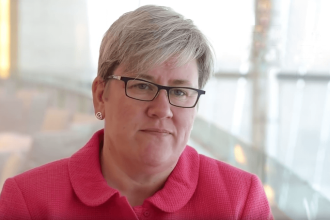At a major event taking place today in Brussels, the authors of an investigation reveal that companies sourcing cocoa from Côte d’Ivoire are promoting the destruction of forests in neighboring Liberia.
The conclusions of the field investigation presented by IDEF representative Bakary Traoré highlight that the traceability mechanisms used by these companies are flawed and do not comply with the new anti-deforestation regulation published on June 9, 2023, in the Official Journal of the European Union. The investigators argue that these mechanisms should be replaced by the robust and transparent national traceability system now in place in Côte d’Ivoire.
“Work is currently underway in Côte d’Ivoire to set up a national traceability system. Under this system, all plots of land in Côte d’Ivoire will be geolocated, and producers will be registered. A map of producers, including a barcode system, will also indicate what individual farms are able to produce and track their sales. Our investigation shows the importance of speeding up the work begun by the Ivorian authorities,” explains Bakary Traoré, Executive Director of the Ivorian NGO (IDEF) and the report’s main author.
“Current traceability systems were set up by the chocolate companies and are controlled by them. They are not transparent, and our investigation found them to be flawed. To resolve the problem and comply with new European regulations, traders in raw materials will have to change their approach.”
Demand for cocoa beans is booming around the world. Before these beans can be transformed into silver- or gold-leafed chocolates for the pleasure of billions of consumers, they have to pass through a complex market made up of a variety of parties acting as intermediaries between small, poorly paid cocoa farmers and retailers.
This world has long been impenetrable, with one major consequence: thousands of hectares of forest have been destroyed to make way for cocoa plantations.
Now, the EU has taken a decisive step with the adoption in June 2023 of the European Union Deforestation Regulation (EUDR) for products linked to deforestation and forest degradation. As of December 2024, it will be illegal to import and market cocoa beans that, after 2020, were harvested on plots of land deforested to create plantations.
This regulation presents a unique opportunity to address the historical problems of deforestation in the cocoa sector, which the industry and certification systems have never been able to resolve voluntarily.
Côte d’Ivoire is the world’s largest producer of cocoa (source: FAO), with 75 per cent of its production absorbed within Europe as its single privileged consumer, including 90 per cent of France’s imports and 70 per cent of Germany’s.
However, for years, cocoa plantations have been developed at the expense of forests, contributing significantly to their destruction.
As land becomes less productive, farmers clear another area of forest, replanting it with cocoa trees. The figures speak for themselves: with 16 million hectares at the beginning of the 20th century (source: REDD+), by 1986 Côte d’Ivoire’s forests had shrunk to 7.85 million hectares. By 2020, when the government clamped down, a mere 2.9 million hectares remained.
As the investigation shows, the situation is driving Ivorian growers to migrate to the fertile lands of neighboring Liberia, home to more than half of West Africa’s remaining tropical forests.
In the three Liberian villages that were the focus of the report, residents stated that, with this migration, no fewer than “183 producers have settled in recent years, 60 between December 2023 and January 2024 alone.”
Not only is there new deforestation taking place, but there is also a lack of infrastructure in Liberia for growers to export their beans. As a result, once harvested, the cocoa beans are carried back to Côte d’Ivoire on people’s backs.
The investigators found that Liberian beans were easily mixed with local product, indiscriminately filling bags intended for ordinary sale as well as those destined for export and certified accordingly. This undermines a system meant to prevent cheating and the importing of beans from other countries.
The traceability system established by the Côte d’Ivoire government is therefore indispensable. By mapping all production plots and having a complete overview of their use, the national system should prevent cheating. At present, because of multiple systems in use, a single plot can repeatedly be designated as a production source, thereby ‘laundering’ cocoa beans produced through deforestation in Liberia.
The investigators also call on the EU to put in place robust controls as part of the due diligence required by EUDR to help curb this.
“The cocoa industry has pledged to end deforestation, but our investigation shows that this is still not happening. EU regulation on deforestation represents a historic opportunity to finally honor the commitment,” said Bakary Traoré. “The best way to achieve it is to implement a national traceability system covering the entire sector, rather than rely on a piecemeal approach by individual companies. We call on traders, certifiers, and the major chocolate companies to join the conversation and commit to a national traceability system in Côte d’Ivoire.”
“Many companies claim to be acting to improve cocoa’s sustainability, but our investigation shows that the reality on the ground is very different from that projected by big PR campaigns targeting European consumers,” Traoré added. “The large companies are afraid of losing their edge and their access to cheap cocoa. They’re doing very well from the inefficient system that has been used so far, and which only produces poverty for millions of producers. This cannot go on.”




